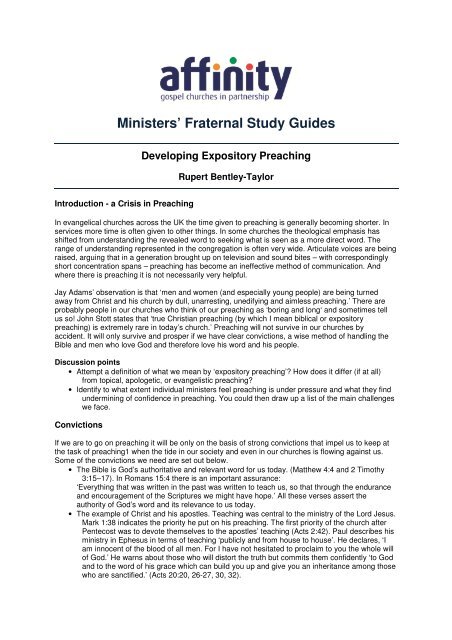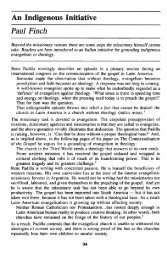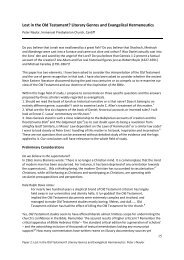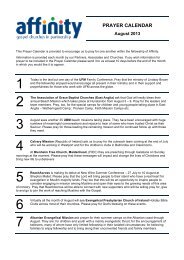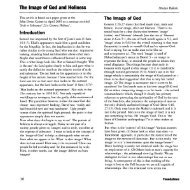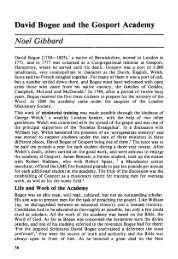Developing Expository Preaching - Rupert Bentley-Taylor - Affinity
Developing Expository Preaching - Rupert Bentley-Taylor - Affinity
Developing Expository Preaching - Rupert Bentley-Taylor - Affinity
Create successful ePaper yourself
Turn your PDF publications into a flip-book with our unique Google optimized e-Paper software.
Ministers’ Fraternal Study Guides<br />
<strong>Developing</strong> <strong>Expository</strong> <strong>Preaching</strong><br />
<strong>Rupert</strong> <strong>Bentley</strong>-<strong>Taylor</strong><br />
Introduction - a Crisis in <strong>Preaching</strong><br />
In evangelical churches across the UK the time given to preaching is generally becoming shorter. In<br />
services more time is often given to other things. In some churches the theological emphasis has<br />
shifted from understanding the revealed word to seeking what is seen as a more direct word. The<br />
range of understanding represented in the congregation is often very wide. Articulate voices are being<br />
raised, arguing that in a generation brought up on television and sound bites – with correspondingly<br />
short concentration spans – preaching has become an ineffective method of communication. And<br />
where there is preaching it is not necessarily very helpful.<br />
Jay Adams’ observation is that ‘men and women (and especially young people) are being turned<br />
away from Christ and his church by dull, unarresting, unedifying and aimless preaching.’ There are<br />
probably people in our churches who think of our preaching as ‘boring and long‘ and sometimes tell<br />
us so! John Stott states that ‘true Christian preaching (by which I mean biblical or expository<br />
preaching) is extremely rare in today’s church.’ <strong>Preaching</strong> will not survive in our churches by<br />
accident. It will only survive and prosper if we have clear convictions, a wise method of handling the<br />
Bible and men who love God and therefore love his word and his people.<br />
Discussion points<br />
• Attempt a definition of what we mean by ‘expository preaching’? How does it differ (if at all)<br />
from topical, apologetic, or evangelistic preaching?<br />
• Identify to what extent individual ministers feel preaching is under pressure and what they find<br />
undermining of confidence in preaching. You could then draw up a list of the main challenges<br />
we face.<br />
Convictions<br />
If we are to go on preaching it will be only on the basis of strong convictions that impel us to keep at<br />
the task of preaching1 when the tide in our society and even in our churches is flowing against us.<br />
Some of the convictions we need are set out below.<br />
• The Bible is God’s authoritative and relevant word for us today. (Matthew 4:4 and 2 Timothy<br />
3:15–17). In Romans 15:4 there is an important assurance:<br />
‘Everything that was written in the past was written to teach us, so that through the endurance<br />
and encouragement of the Scriptures we might have hope.’ All these verses assert the<br />
authority of God’s word and its relevance to us today.<br />
• The example of Christ and his apostles. Teaching was central to the ministry of the Lord Jesus.<br />
Mark 1:38 indicates the priority he put on his preaching. The first priority of the church after<br />
Pentecost was to devote themselves to the apostles’ teaching (Acts 2:42). Paul describes his<br />
ministry in Ephesus in terms of teaching ‘publicly and from house to house’. He declares, ‘I<br />
am innocent of the blood of all men. For I have not hesitated to proclaim to you the whole will<br />
of God.’ He warns about those who will distort the truth but commits them confidently ‘to God<br />
and to the word of his grace which can build you up and give you an inheritance among those<br />
who are sanctified.’ (Acts 20:20, 26-27, 30, 32).
Teaching the Bible is not simply a matter of Sunday services. Peter Adam, after identifying thirty three<br />
verbs used in the New Testament to describe a great variety of forms of ministry of the Word, wisely<br />
writes, ‘Those of who are committed to preaching need to be committed to a wider ministry of the<br />
Word as well… It is important to grasp this point clearly or we shall try to make preaching carry a load<br />
which it cannot bear; that is, the burden of doing all the Bible expects of every form of ministry of the<br />
Word… Our ministry may be pulpit-centred, but it should not be pulpit-restricted for such a ministry of<br />
the Word will suffer severe limitations’. (Peter Adam, Speaking God’s Words, IVP 1996, pp. 59 & 75)<br />
The explicit commands to pastors and teachers in the church. Paul’s words in 1 Timothy 4:13–16 and<br />
2 Timothy 4:1–5 indicate the expectation that God’s servants will be faithful in preaching and teaching<br />
even though the climate of our times will become increasingly hostile to us doing so.<br />
Discussion points<br />
• Was the preaching of Jesus ‘expository’?<br />
• Share what verses/passages have especially encouraged and strengthened you in keeping at<br />
the task of preaching the Bible.<br />
Our method in handling the Bible<br />
Using and quoting the Bible is no guarantee of the value of what is said. Satan is quite happy to quote<br />
the Bible and use it for his own ends (see Matthew 4:6).<br />
Peter, writing in 2 Peter 3:16 about Paul’s letters comments, ‘his letters contain some things that are<br />
hard to understand, which ignorant and unstable people distort, as they do the other Scriptures, to<br />
their own destruction.’ We have all heard bad preaching. Some has been simply dull and unapplied.<br />
On other occasions the message of the sermon has had little or no connection with the text of the<br />
Bible, and may have promoted false theology. But not only have we heard bad teaching, we are all<br />
quite capable of it ourselves! We will not preach faithfully and helpfully without care, prayer and effort.<br />
In 2 Timothy 2:15 Paul commands, ‘Do your best to present yourself to God as one approved, a<br />
workman who does not need to be ashamed and who correctly handles the word of truth.’ The<br />
conviction of this study guide is that careful expository preaching is vital for the health of our<br />
churches.<br />
<strong>Expository</strong> preaching is aptly summed up by Alec Motyer as ‘a display of what is there’. Our job is not<br />
to be clever magicians who produce a message out of thin air but to be faithful servants who explain<br />
and apply what God has already put before us in the Scripture. Charles Simeon of Cambridge wrote,<br />
‘I do not sit down to impose a sense on the inspired writers, but to receive one as they give it to<br />
me. I pretend not to teach them, I wish like a child to be taught by them…My endeavour is to bring out<br />
of Scripture what is there and not to thrust in what I think might be there. I have a great jealousy on<br />
this head, never to speak more or less than I believe the mind of the Spirit in the passage I am<br />
expounding.’ If we take this task seriously it is both a release, because I do not have to invent<br />
anything, and a discipline, because I must work very hard at being faithful to what is there.<br />
Key Features of Preparing to Expound the Bible<br />
• Look for the ‘big idea’. Everything is in the Bible for a reason. Jay Adams writes, ‘You must<br />
never preach on a passage until you are certain you understand why the Holy Spirit included<br />
that passage in the Bible.’ We need to observe carefully what God has put before us. Martin<br />
Luther graphically likened the process of understanding the Bible to picking apples: ‘First I<br />
shake the whole tree that the ripest may fall, then I climb the tree and shake each limb, and<br />
then each branch and then each twig and then look under each leaf.’<br />
• Be aware of context. John Stott writes, ‘Every word of the Bible is true only in its context.<br />
Isolated from its context, it may be quite untrue’. In Matthew 4:6 Satan correctly quoted Psalm<br />
91:11-12, but divorced those verses from their context, ignoring the condition expressed in<br />
the verse before and the promise in the following verse. Every passage of Scripture comes in<br />
the context of the progressive history of salvation, in the context of the specific book which<br />
has a particular purpose and is set in an particular historical and cultural situation, and in the<br />
context of the passage itself. Remember that Scripture never contradicts itself and comparing<br />
Scripture with Scripture will help us to understand each passage properly.
• Avoid fanciful interpretations. John Calvin wrote wisely, ’Let us know, then, that the true<br />
meaning of Scripture is the natural and obvious meaning; and let us embrace and abide by it<br />
resolutely. Let us not only neglect as doubtful but boldly set aside as deadly corruptions,<br />
those pretended expositions which lead us away from the natural meaning.’<br />
• Take the literature and the language seriously. <strong>Preaching</strong> from law, poetry, apocalyptic, a<br />
parable, a proverb, an epistle or a narrative requires some understanding of that type of<br />
literature. There are often things to be aware of in the text of the Greek or Hebrew that may<br />
not be evident in our translation. The closer we can get to the original text God inspired, the<br />
better. We do not have to be great experts ourselves because we can generally learn what<br />
we need from the commentaries. This will spare us from inaccurate handling of the text.<br />
• Apply. Romans 15:4 indicates that the ancient Scripture was always written with us in mind.<br />
The heart of application is not moving out of the text but looking more carefully at it and<br />
asking ourselves: ‘What it is there for?’ We do not so much make the Bible relevant as show<br />
that it is relevant by applying its principles appropriately to our hearers. Always we need to be<br />
aware of our hearers and their world, as for example, Jesus was in all his parables and<br />
Paul was when in spoke in Athens in Acts 17.<br />
Discussion points:<br />
• Accepting that there is no perfect sermon and we are all learners, what aspects of the<br />
suggestions for expository preaching have you found most helpful in your experience?<br />
• Are there any other principles which you would want to add?<br />
The Men who Preach<br />
Although the Bible is an infallible and perfect word, God’s general means is to use human agents to<br />
explain it. When Ezra read out the Book of the Law in Nehemiah 8 we read in verses 7–8 of the<br />
Levites who ‘read from the Book of the Law of God, making it clear and giving the meaning so that the<br />
people could understand what was being read’. When the Ethiopian eunuch was reading from Isaiah<br />
53 Philip asked him ‘Do you understand what you are reading?’. He replied, ’How can I, unless<br />
someone explains it to me?’ (Acts 8:30–31). On the road to Emmaus Jesus himself concealed his<br />
identity in order to give time to explain all that the Scriptures said about himself. The disciples had the<br />
Scriptures but needed the voice of explanation.<br />
Those who preach should not do so lightly. In James 3:1 we are warned: ‘Not many of you should<br />
presume to be teachers, my brothers, because you know that we who teach will be judged more<br />
strictly.’ In 1 Corinthians 3:10-15 Paul likens the task of those who teach to that of builders and warns<br />
us that ‘each one should be careful how he builds’ in the light of the fact that ‘the builder’s work will<br />
be shown for what it is, because the Day will bring it to light. It will be revealed with fire, and the fire<br />
will test the quality of each man’s work.’ Our most important audience is not the people we see but the<br />
God we serve, hence in 2 Timothy 3:15 Paul urges Timothy to ‘present yourself to God as one<br />
approved, a workman who does not need to be ashamed and who correctly handles the word of<br />
truth’. There is always a danger that teaching and preaching makes us feel proud and self important<br />
or that we preach one thing but live another. Paul told Timothy to ‘watch your life and doctrine<br />
carefully’ (1 Timothy 4:16). Richard Baxter wrote, ‘Take heed to yourselves lest you unsay with your<br />
lives what you say with your tongues and be the greatest hindrances of the success of your own<br />
labours… we must study as hard how to live well, as to preach well.’<br />
The great consolation of the preacher is that God is committed to use weak and inadequate people<br />
and he is sufficient for each of us. Paul beautifully combines realism about us and confidence in God<br />
in 2 Corinthians 4:7: ‘We have this treasure in jars of clay to show that this all-surpassing power is<br />
from God and not from us.’<br />
Discussion points<br />
• What are the most obvious snares in being someone who preaches regularly and how do we<br />
overcome them?<br />
Possible Bible Studies<br />
The above notes are discussion starters rather than a definitive examination of expository preaching.<br />
It may be helpful to include a study of one or two passages.
How Satan uses the Bible: Matthew 4:6 and Psalm 91:11-12<br />
_ What might we learn from the fact that Satan knows the text of Scripture?<br />
_ Examine carefully how Satan abuses the Scripture he quotes.<br />
_ What particular warning for us should we learn from this incident in our<br />
handling of the Bible?<br />
_ How does the Lord Jesus’ use of Scripture differ from Satan’s?<br />
How Jesus uses the Bible: Luke 24:25-32<br />
_ How would we explain why Jesus conceals his identity (verse 16) on the<br />
journey to Emmaus?<br />
_ What was the problem these disciples had when it came to the Scriptures?<br />
Could it be ours?<br />
_ How does Jesus teach us to regard the Old Testament?<br />
_ Jay Adams says, ‘Preach Christ in all the Scriptures: he is the subject matter<br />
of the whole Bible. He is there. Until you have found him in your preaching<br />
portion you are not ready to preach’. In the light of the above passage would<br />
you agree with Adams?<br />
Further reading<br />
There are a great number of books on this subject but these are some of the most helpful.<br />
D. Martyn Lloyd-Jones, <strong>Preaching</strong> And Preachers, Hodder and Stoughton 1971<br />
John Stott, I Believe In <strong>Preaching</strong>, Hodder and Stoughton 1982<br />
Jay Adams, <strong>Preaching</strong> With Purpose, Zondervan 1982<br />
Gordon Fee and Douglas Stuart, How To Read The Bible For All Its Worth, Scripture Union 1982<br />
Haddon W. Robinson, <strong>Expository</strong> <strong>Preaching</strong>, IVP 1986<br />
Ed. Christopher Green and David Jackman, When God’s Voice Is Heard, IVP1995<br />
Peter Adam, Speaking God’s Words, IVP 1996


